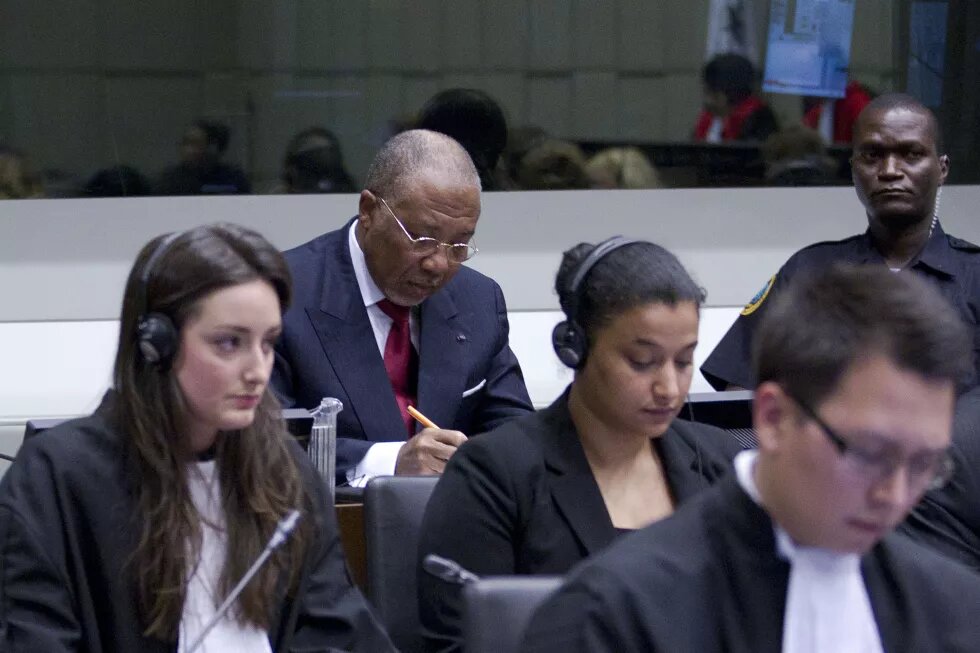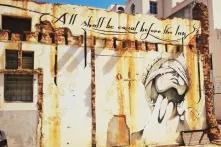
On 26 April 2012, Charles Taylor, the former president of Liberia, was found guilty before the Special Court for Sierra Leone on eleven counts, among them sexual slavery and rape.[1] Taylor, a one-time warlord, is viewed as one of those primarily responsible for the war crimes committed during the civil war in Sierra Leone[2] . Through Taylor's prominence and the fact that, for the first time ever, a former African president has been convicted, this last sentence passed by the SCSL has been the focus of special attention of the Western media. From a feminist perspective, the sentence appears to represent a milestone in international penal jurisdiction because, for the first time ever, a former president has been convicted of sexualised war crimes before an international criminal court. For security reasons, the Taylor trial was moved from Freetown to The Hague. Unlike his co-defendants, he will not serve his sentence in Ruanda either, but in London. The sentence was set at 50 years and, given Taylor's age, equates more or less to life imprisonment.[3]
The sections below outline what the Special Court for Sierra Leone is, its role in trying war-related sexualised violence and the verdict passed against Taylor.
The Special Court for Sierra Leone
The Special Court for Sierra Leone is a so-called hybrid court; this means that it is a mix of inter-national and national jurisdiction. It was established as a Special Court for Sierra Leone (SCSL) in Freetown, the capital of Sierra Leone, on the basis of a treaty under international law after the government of Sierra Leone approached the United Nations in 2000 with a “request for support in creating a criminal tribunal[4]. This sets it apart from various other international tribunals which have come into being by virtue of resolutions of the UN Security Council, such as the International Criminal Tribunals for the former Yugoslavia (ICTY) and Ruanda (ICTR). The hybrid nature of the court is also manifested in the fact that both national and international judges presided over it. As a result, it presented a greater chance of the trial and the corresponding preceding investigations being supported by the countries involved and of being accepted by the populace and viewed as legitimate. Unlike the International Criminal Court in The Hague, for which a special fund was set up within the United Nations, the SCSL is funded through voluntary donations made by UN member states. The biggest financial contribution was made by the USA and Great Britain. Its exact structure is described in the statute of the SCSL[5] which also defines its powers under international law.
The statute of the Special Court for Sierra Leone prescribes that sexualised violence can be prosecuted under paragraph 2 as a “crime against humanity” and paragraph 3 – breaches of the Geneva Conventions and their Additional Protocols. The crimes of sexualised violence are listed individually: rape, sexualised slavery, forced prostitution, forced pregnancy and other forms of sexual violence.
International penal jurisdiction and war-related sexualised violence
The Rome Statute of 1998, the founding treaty and legal basis for the International Criminal Court, is the first binding document under international law to categorise sexualised violence and rape as war crimes and crimes against humanity. It also bans by law violent crimes against civilians based on certain traits, among them gender. Key follow-up documents on war-related sexualised violence and the ongoing impunity towards offenders, are UN Resolution 1325 (2000) and, above all, UN Resolution 1820 (2008)[6], which represents a turning point because it specifies rape as a means of war.[7] Through its judgements on sexualised violence and rape, the International Criminal Court aims to deter and, in future, prevent war-related sexualised violence.
From a feminist perspective, the legal means to convict sexualised violence are still not being implemented to a satisfactory degree in international legal practice. For example, the Special Court for Sierra Leone has not consistently succeeded in ensuring that rape and sexualised violence are tried and prosecuted as war crimes and crimes against humanity. Of thirteen defendants, seven[8] were convicted of violent sexualised crimes. In the process, only the offenders belonging to the rebel parties Revolutionary United Front (RUF) and Armed Forces Revolutionary Council (ARFC) were convicted. The defendants belonging to the Civilian Defense Force (CDF) were not convicted of war-related sexualised violence, however. Although they were accused of rape, the court was not prepared to allow women to testify on these allegations, and statements that rape victims had given were subsequently removed from the files. As a consequence, the three accused, Fofana, Kondema and Norman, were exempted from being tried for the violent sexualised crimes they had been charged with.
Conviction of Charles Taylor
It was therefore all the more important for Charles Taylor, a high-ranking war criminal, to be con-victed of “planning, aiding and abetting the commission of rape and sexual slavery”. Taylor's con-viction is a first.
The question as to how far the Taylor conviction can actually break ground in terms of how inter-national criminal tribunals handle sexualised crimes has yet to be seen. The jury is also out on whether it can have any impact on the use of rape as a means of war. This and other questions will be discussed during an event organised by the Gunda Werner Institute on “Former Liberian President Taylor Convicted – a milestone against sexualised war crimes? The International Criminal Court 10 years on” on 04.07.2012.
30.11.1996 - 18.01.2002
Prosecution period (for crimes committed during this period; Charles Taylor charged)
25.05.1997 The SL army overthrows President Ahmad Tejan Kabbah with the help of the RUF and AFRC; Charles Taylor supports the rebels02.08.1997Charles Taylor elected as President of Liberia04.06.2003The Special Court for Sierra Leone formally charges Charles Taylor. An international warrant for his arrest is issued. Taylor contacts the court to ask it to nullify the arrest warrant.11.08.2003Charles Taylor goes into exile in Nigeria31.05.2004Taylor's petition to have the arrest warrant nullified is rejected29.03.2006Ellen Johnson Sirleaf, President of Liberia, demands that Taylor be extradited from Nigeria03.04.2006After his extradition, Taylor is formally charged by the SCSL in Freetown. He pleads not guilty to all eleven charges.20.06.2006For security reasons, Taylor is transferred to The Hague04.06.2007 - 27.02.2009The prosecution presents its case (a total of 94 witnesses are interviewed (three later on in August 2009, with three experts among them) and 782 pieces of evidence entered)13.07.2009 - 12.11.2010The defence presents its case (a total of 21 witnesses are interviewed (including Charles Taylor) and 740 pieces of evidence entered)11.03.2011The prosecution and defence rest their case in the Taylor trial26.04.2012A verdict is returned on Charles Taylor; he is found guilty on all eleven points19.06.2012The SCSL serves notice that Charles Taylor is appealing the verdict
Sources:
Kendall, Sara, Michelle Staggs (2005).
"Silencing Sexual Violence: Recent Developments in the CDF Case at the Special Court for Sierra Leone.” http://socrates.berkeley.edu/~warcrime/Papers/Silencing_Sexual_Violence…
Kondoch, Boris (2001). “Neueste Entwicklungen im Völkerstrafrecht aufgezeigt am Beispiel Sierra Leone, Kambodscha und Ost-Timor” In S+F Nr 3/2001
Special Court for Sierra Leone: http://www.sc-sl.org
______________
Footnotes:
[1] Charles Taylor, who had pleaded not guilty at the beginning of the trial, is appealing the sentence. As a result, the verdict of the people of the SCSL vs. Charles Ghankay Taylor is not yet final and absolute.
[2] The civil war in Sierra Leone broke out in March 1991. Charles Taylor was instrumental in supporting the Revolu-tionary United Front RFU in the armed conflict against the government of Sierra Leone. The charges against Taylor that are of relevance to his prosecution are limited to the time between 30.11.1996 and 18.01.2002. Taylor was not tried for crimes he allegedly committed in Liberia or for crimes committed in Sierra Leone up to the end of 1996.
[3] The case has now gone into appeal. The verdict is therefore not final and absolute.
[4] Kondoch 2001, p.126
[5] http://www.sc-sl.org/LinkClick.aspx?fileticket=uClnd1MJeEw%3D&
[6] Other UN resolutions in the war against war-related sexualised violence: 1888, 1889 und 1960.
[7] Up to that time, quite apart from what feminist conflict research asserted, the following applied then and still applies today: rape as an accidental but unavoidable by-product in violent conflicts. This underestimates the political background and interests of sexualised violence.
[8 ] Of the thirteen people charged, nine were convicted because the other four had died in the meantime.
